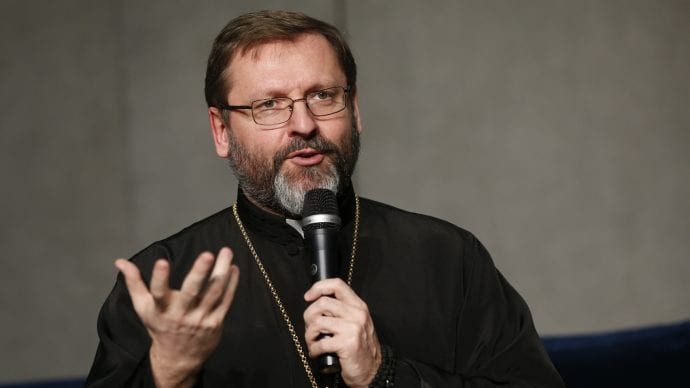Major Archbishop Sviatoslav Shevchuk, head of the Greek Catholic Ukrainian Church, is urging victims of violence, particularly clerical sexual abuse, to speak up, saying that survivors have the right not only to consolation but also justice.
“We affirm once again that we will listen to anyone who may have been a victim or witness of violence in any environment, including the Church,” Shevchuk wrote in a pastoral letter released on Monday. “At the same time, we urge them: Do not keep silent!”
The archbishop said overcoming the problem “has both a pastoral and a legal dimension,” noting that no one, even within the clergy, is exempt from the rule of law, and a crime is a crime, regardless of the perpetrator.
The Greek Catholic Ukrainian Church has around 5 million members, with the majority in Ukraine but also a large diaspora presence in nearly 40 countries.
According to Shevchuk, the Church is committed to upholding the principles of justice and truth, and is committed to developing programs for the protection of vulnerable persons.
“Christ and His disciples are always on the side of victims,” he wrote, saying that every bishop in the Ukrainian Church is ready to listen.
“We want to state, loudly and clearly: No one has the right to silence or justify wrongdoing, pain, sin, and crime,” he wrote. “Victims must be heard, especially by the Church.”
Though the letter is mainly focused on addressing the pain caused by clerical sexual abuse of children, Shevchuk also recognizes that abuse can occur “in all environments of human society.”
However, he asked for forgiveness on behalf of the Ukrainian Catholic Church to all those who’ve suffered “sexual, physical, psychological, emotional, financial or other forms of violence or abuse in our parishes, dioceses, monasteries, schools, seminaries, or other church structures.”
He also apologizes to all those who were “confronted with indifference” and instead of receiving help were silenced, the crimes against them covered up.
In the letter, signed Oct. 14, Shevchuk also urges all state institutions, structures of civil society and businesses to “realize the extent of the spread of violence, manipulation and outrage against minors and the vulnerable, in the modern world.”
These problems, he wrote, have been present wherever there are people, including families, schools, hospitals, sports and cultural settings as well as in churches and monasteries.
One of the root causes of violence, he said, is the issue of the common general culture; in particular, the way in which power is exercised within any institution, including the Church.
“Is Church authority a ministry or is it domination of others? Do Church authorities listen to and respect the people with which they are entrusted to lead? Is it not, at times, distorted by authoritarianism, elitism, and the belief that those in power should not be held accountable to anyone?” Shevchuk asked.
Much like Pope Francis has done repeatedly, he warned against the temptation of clericalism, defining it as clergy using the Church and its spiritual authority for personal purposes instead of serving God and the faithful.
“Clericalism creates an artificial division between members of the Church, underestimates the role of the laity, distorts the notion of obedience and humility in monasticism and priesthood, and presents the Church as an institution made up exclusively of bishops and priests,” he wrote. “The phenomenon of clericalism is devastating to the Church because it distorts its image.”
Tying it specifically to the situation of Ukraine, which was under the rule of the Soviet Union for decades, Shevchuk argued that in post-genocidal societies, “which have already been wounded by the systematic violence of totalitarian regimes, wounded by war or the cult of ‘gratification at all costs, with minimum responsibility,’ human beings become the bearers of historical and new traumas, and are especially vulnerable and defenseless against abuse.”
He also ties the letter to what the Vatican has done recently to promote child protection, quoting the pope’s motu proprio, Vox estis lux mundi [“You are the light of the world”], released earlier this year. According to this document, all eparchies and dioceses of the Catholic Church are expected to have an internal system for reporting sexual abuse by May of next year, with bishops being obligated to investigate every accusation.
Greek Catholic Ukrainian Archeparch Borys Gudziak of Philadelphia told Crux that the issue of clerical sexual abuse hasn’t yet fully hit the Eastern Rite Church.
“There doesn’t seem to be a broad syndrome of child abuse in the [Ukrainian] Church, but we don’t know if this is a fact or if it’s hidden by taboo,” he said in September, after the Greek Catholic synod met in Rome.
“There doesn’t seem to be cover-up, but we’re realizing that this plague is in sports, medicine, schools, families, so it would be surprising if it wasn’t in the [Ukrainian] Church.”
The archbishop said Ukraine’s still existent taboo inhibiting public speech about abuse mustn’t affect the Church.
“We want to be the ones who in Ukrainian society are the ones who speak out about it, pointing to the excruciating suffering of victims.”
Gudziak said he believes that in Ukraine and other post-communist countries accustomed to authoritarian and paternalistic leadership, people in society do not always own up to the violence they might perpetrate.
In addition, he said the systems that produce fear tend to make people more aggressive: When afraid, humans tend to defend themselves through violence.
Furthermore, the weak and those on the margins are unable to defend themselves.
“It’s in this context that we are speaking about these hideous crimes of child abuse, which are present in all of society, including the Church in Ukraine,” he said. “To what extent, we don’t know, because the taboos haven’t been lifted. And we want to do so.”

